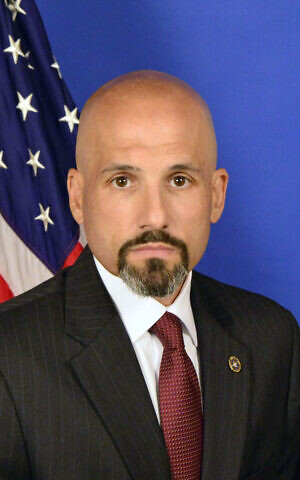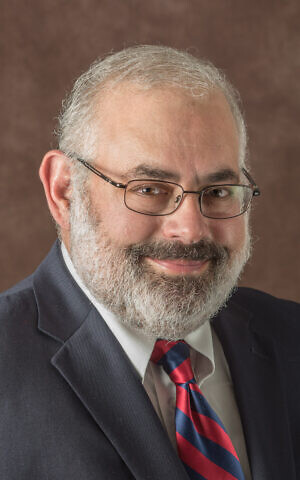Understanding Zoombombing
Cases of anti-Semitic Zoom intruders continue through the pandemic in Jewish Atlanta despite efforts to keep the modern cyber ‘crank calls’ at bay.
There have been 15 Zoombombing incidents reported to the Anti-Defamation League’s Southeast regional office in Atlanta in the past year, according to Allison Padilla-Goodman, vice president of ADL’s Southern Division. More than half of those targeted the Jewish community, she said.
The most recent incident took place during a funeral service Feb. 28. There were about 30 guests on Zoom and 20 intruders took control of the service, Eddie Dressler of Dressler’s Jewish Funeral Care told the AJT.
“It was a first for us and it was deplorable,” he said. “I think it lasted about 10 minutes until we took control. I immediately implemented recommendations from Zoom for future live streaming and I feel confident their recommendations will prevent future disruptions. We’ve informed and heeded advice from the ADL, FBI, and local law enforcement.”

The AJT asked Padilla-Goodman and Community Security Director Neil Rabinovitz about the recent events, the increase in Zoombombing during the pandemic and how it occurs.
Zoombombing is basically a group hijacking the Zoom platform’s screen-sharing feature to project graphic verbal and visual content to unwitting meeting participants in an attempt to shock and shut down those gatherings, according to a compilation of online definitions.
The cases of Zoombombings in the Jewish community have trickled in throughout the pandemic, a period when more people turned to the video teleconferencing platform Zoom for such gatherings as office meetings, synagogue services, activities, simchas and family holiday celebrations, according to Rabinovitz, who handles security for the community through the Jewish Federation of Greater Atlanta in partnership with the national Secure Community Network.
Before the recent funeral Zoombombing, the latest incident in Jewish Atlanta occurred Feb. 13 when an online Shabbat service of Congregation Etz Chaim was ambushed by the hurling of anti-Semitic, neo-Nazi and racial slurs and profanity, including some in the Zoom chat feature, along with a few graphic pornographic images.

Cobb County police traced the incident to teenagers, mostly from Europe and possibly Nevada, connected by an online video game and who communicated through social media their intent to disrupt an unprotected Zoom meeting, according to Etz Chaim Executive Director Marty Gilbert. He said he got the police report a week after the incident, Feb. 19, that one person trolled the internet for an easily accessible Zoom meeting and another texted through social media calling for “reinforcements” to disrupt the Shabbat service.
Cobb Police said the investigation is currently inactive. “There did not appear to be any imminent or viable threats to the safety of the congregation,” according to Public Information Officer S. A. Barner in a statement to the AJT. “This incident appeared to be juveniles interrupting the [synagogue] service with intentions of causing a scene. Since the popularization of Zoom, ‘Zoom Bombing’ has become a pastime where hackers enter unsecured meetings for the sole purpose of entertainment.”
Barner told the AJT it is “extremely hard to trace” hackers and technology crimes and especially if the perpetrators aren’t even in the country.
Gilbert described the incident as the modern version of crank calls, except with modern technology and much more “hurtful and graphic” comments. The synagogue initiated tighter Zoom security following the incident after having kept Shabbat services open to anyone who wanted to attend, he said.
It was the second such Zoombombing of an Etz Chaim Shabbat service. The previous incident occurred April 3.
Rabinovitz said perpetrators of Zoombombing, if apprehended, could be charged with state or federal crimes, depending on the circumstances. As examples, he cited: “disrupting a public meeting, computer intrusion, using a computer to commit a crime, hate crimes, or transmitting threatening communications.”
Another incident this year in the Jewish community occurred Jan. 23 during a Gesher L’Torah shiva call. On behalf of the synagogue, Executive Director Doug Konkel released a statement on the disruption.
“Our solemn gathering to memorialize a beloved member of the congregation was disrupted by a Zoombombing. Like other institutions of faith, the COVID-19 pandemic has required us to resort mainly to technological approaches to carry out even our most personal and sacred gatherings.
“Even though we have prepared ourselves for these kinds of hurtful attacks and we were able to protect the call with relatively little damage done to its sanctity, these malicious attacks on our community, even if virtual, are a terrible reminder of the hate and bigotry that still lurks and the reason we have needed to provide security whether in person or online.”

Asked if certain synagogues or groups were being targeted by the latest Zoombombing, Padilla-Goodman responded, “Some Zoombombers are opportunistic. They take advantage of poor security settings or are eager to have opportunities to write terrible things. Sometimes they are targeting classes or open events. We also have documented a lot of others that are geared to specific communities or people and some of those involve extremists or bigots.
“In other words, there is just really a wide range based on what we have observed. It’s not that specific synagogue or events are being targeted. It’s really about how public events are.”
When cases of Zoombombing occur, she said, the synagogues usually take stronger security stands and they typically aren’t Zoombombed again.
Both she and Rabinovitz said the Jewish community has to keep their guard up when it comes to security breaches.
The Jewish community isn’t alone when it comes to being Zoombombed. In August, internet trolls targeted the Rev. Raphael Warnock when he was running for the U.S. Senate, according to media reports. The perpetrators hurled racist slurs, showed Nazi symbols and pornographic images as Warnock began to speak on a Zoom meeting of the Hall County Democratic Party, the reports indicated.
If it’s any indication how Zoombombing has become part of the security threat landscape in the Jewish community, information on “video conference best practices” is listed along with the Federation’s security documents for responding to active shooters, bomb threats, high holiday security planning and cybersecurity in the age of COVID.
Rabinovitz said Zoombombers are instigators. A group may or may not have a place or plan for how to disrupt, he said. They use porn or other shocking negative means “to get a rise out of people” and that’s easy to do in religious services, he said.
“That’s why it’s so incumbent upon our organizations to have security procedures.”

He said its very easy to secure Zoom events with just a few clicks. Such measures include requiring registration, using waiting rooms, vetting those who ask to attend, refusing to admit those who are unknown unless they provide further identification. The host can prevent anyone from unmuting themselves and if intruders gain access to the meeting, the chat can be disabled and the unwelcomed troublemakers can be immediately removed, Rabinovitz said.
“What we see in the community is they try to balance being open and welcoming and accessible” with the need for a secure meeting, he said. The Jewish groups want to be open for out-of-town relatives or people not as computer savvy to have easy access.
He compared the lack of security to locking synagogues or homes 364 days of the year and on the last day intruders get through. The consequences of posting open Zoom links are security breaches, he said.
Rabinovitz stressed the importance of reporting incidents to local law enforcement and the FBI’s Internet Crime Complaint Center, www.ic3.gov.
Incidents can also be reported to the Jewish Federation of Greater Atlanta’s communitywide security network, the Secure Community Network, DutyDesk@SecureCommunityNetwork.org, or 844-SCN-DESK.
To learn more about securing your network, review the Secure Community Network’s video conferencing best practices.




comments